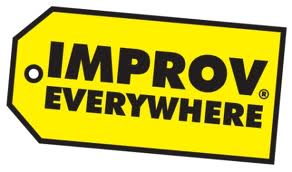In my former life, I was studying to be an Improv actor. Along the way, I had the fortunate opportunity of meeting and learning from some of the best improvisers. At Second City, Improv Olympic and the Upright Citizens Brigade theaters, I studied the craft of Long-Form Improv. Long Form Improv is when players create a full length show (usually 45 minutes to an hour) from a one word suggestion solicited from the audience. It was developed by the late, great Del Close and theaters around the world have adapted this form of comedy.
 Improvisation is not about being funny—that’s not the point. Don’t get me wrong—some of the Improv I’ve seen is downright bust-a-gut, tears-in-my-eyes, pee-my-pants funny. But if you went on stage with the sole purpose of being funny, it most likely had the opposite effect. Good improv is ultimately about being present: listening and reacting genuinely to the action unfolding on stage. Improv tests your ability to think on your feet while teaching you to react and adapt to new situations and information in real time. There is no net! The skills needed to perform, without a script, are some of the same skills needed to be successful in business (and at home or school).
Improvisation is not about being funny—that’s not the point. Don’t get me wrong—some of the Improv I’ve seen is downright bust-a-gut, tears-in-my-eyes, pee-my-pants funny. But if you went on stage with the sole purpose of being funny, it most likely had the opposite effect. Good improv is ultimately about being present: listening and reacting genuinely to the action unfolding on stage. Improv tests your ability to think on your feet while teaching you to react and adapt to new situations and information in real time. There is no net! The skills needed to perform, without a script, are some of the same skills needed to be successful in business (and at home or school).
Principles of Improv (and life)
The key to creating an engaging show is achieved by following some basic principles:
- “Yes, and…”: It’s all about agreement. In Improv, it’s about saying yes to another player’s idea and taking it one step further by giving it more detail. In business, it’s about taking a new idea and developing it. Saying no to new ideas will inevitability stop a scene – or a brainstorming, meeting or debate. No idea is a bad one in Improv. When a fellow player makes a choice, you support her and jump in with both feet.
- Active Listening: When you’re on stage without a script, listening is all you have. If you’re up there planning on what you are going to say next, you can’t actively listen and react truthfully to the information. When you are checking your phone or reading emails in meetings…you’re not actively listening. Participate fully!
- Commit: Don’t second guess yourself. Second guessing yourself in the middle of a scene will destroy it and let down your partners and audience. Trust your instincts. Turn off that monitor in your head who’s always asking, “is this the right choice?” Go for it!
- Team vs. Solo: Jokes usually aren’t funny in Improv. When you’re telling jokes or one-liners, you’re usually going for a cheap laugh. This is not to say jokes and one-liners have no place in entertainment—because they do. Louis C.K. has taken the stand-up art form to a new level. But Improv is not about soloing. It’s about being a player on a team. Supporting that team is the foundation of Improv. If you’re only out for yourself, you cannot succeed in Improv. Lose the ego and go along for the ride.
Many businesses have caught onto the importance of the tenants of Improv. The famed Second City in Chicago has created an entire corporate training function (Second City Biz Co.) that travels around the country teaching Improv skills to employees and business leaders. What groups like Second City’s Biz Co. tap into is a simple truth: When Improv is done right, it’s like a pitch-perfect grand symphony—except that it’s performed by artful musicians without sheet music. Players are listening, reacting truthfully and supporting each other.
Just image if that was how you conducted your next brainstorming session or board meeting!
Resources
http://www.uprightcitizens.org/




Improve with Improv | Change Conversations http://t.co/u6qe3TNf